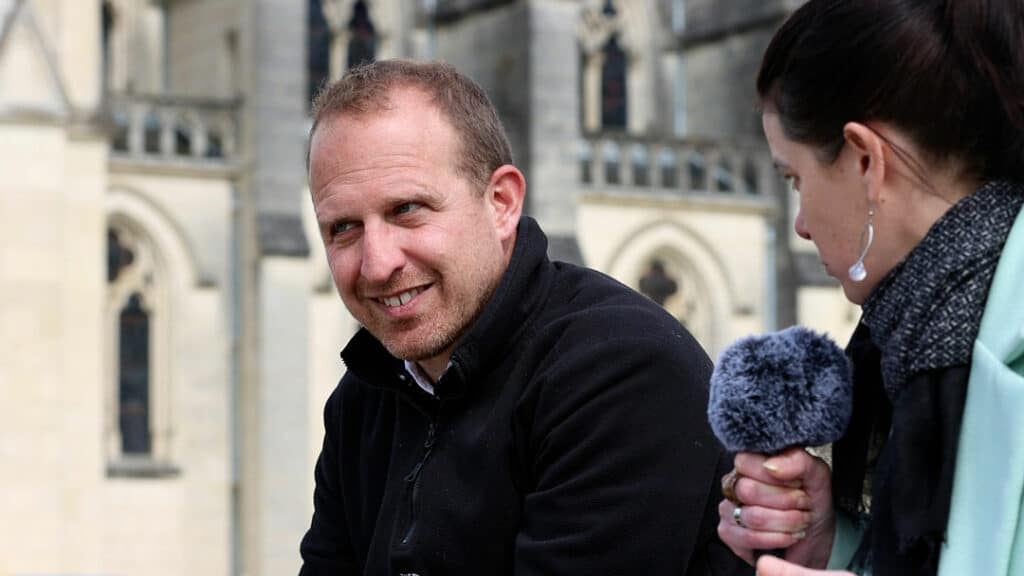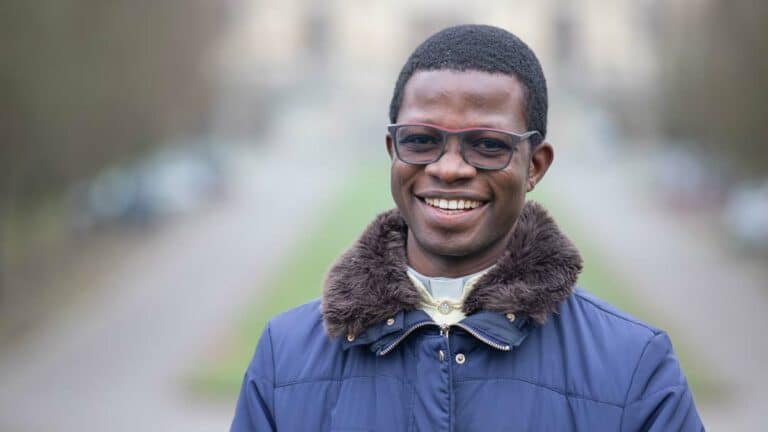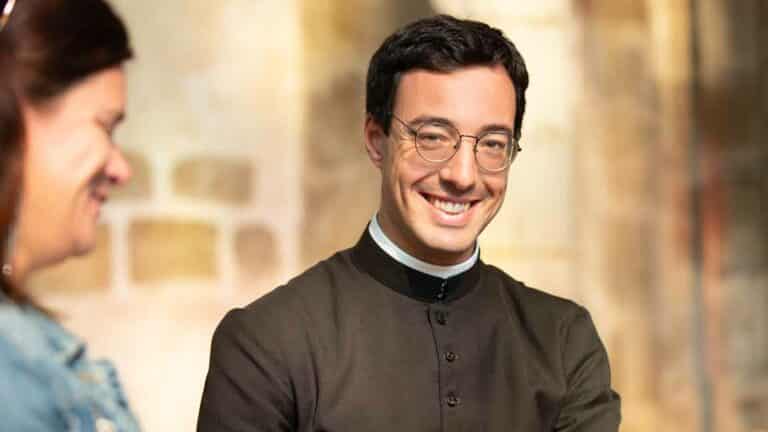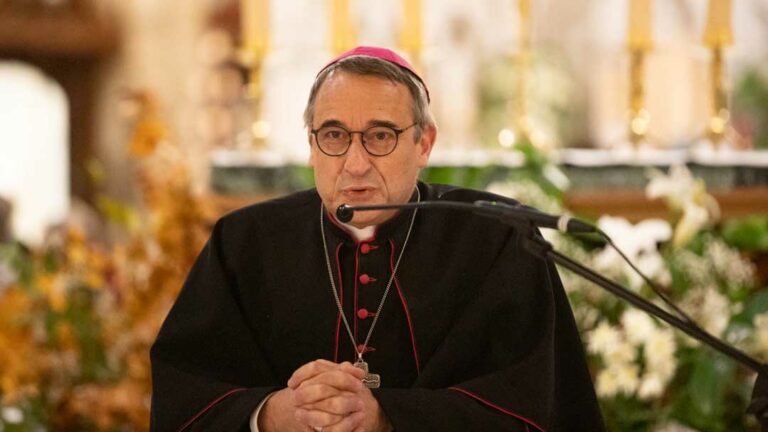Mankind has been fascinated with the idea of communicating with the dead since the dawn of time. From shamanic practices to ancient societies through spiritualism sessions in the 19th century or recent apps imitating the voice of the deceased, this quest raises universal questions. Is it really possible to engage into a dialogue with the after-life? Or is it just a psychological need to maintain a link when faced with the unknown?
How do you communicate with the dead? We asked this question to don Paul Denizot, rector of the Notre-Dame de Montligeon shrine.
Why is the need to talk to the dead so strong?
Grief and death create a violent separation. We can no longer see those we have loved, we can no longer touch them, we can no longer feel their presence.
Yet, all of us — I believe — harbour this desire, deep within, that the relationship be maintained. One of the means for this continuity to exist is to talk to those who have departed.
Man cannot come to terms with the death of a loved one. He cannot accept that death should put an end to the love that has united people who love each other.
There is a kind of inner resistance to death, and a way of still wanting to reach the deceased. Talking to them is the ultimate way to get in touch with them.
Can I really talk to my deceased loved ones?
In mankind generally, there is some kind of fundamental insight telling us that we can still do something for the deceased. All civilizations have performed rites and prayers for the dead, as shown by the ancestors worship in Africa or in Asia, for instance. Now, such insight is an opening to Revelation.
According to what is revealed by faith, the relationship between those who have departed in the peace of Christ and those who are still on the way remains alive and endures beyond death. This is not just an intuition, it is a profound certainty of faith, a truth. There is a real communication between the living and the dead.
A dialogue is possible. although not through speech. It is an exchange of love that can continue to circulate between the living and the dead. That is the communion of saints.
How do we communicate with the deceased?
The Church does not refer to “communicating with the dead”, since communication generally implies sensitive signs (sounds, or words…). Rather, it heralds a deeper reality, a communion between the living and the dead.
As we mentioned it before, this link of love remains alive since God is its source, enabling a union with those I love who have gone through death. That’s why the Church refers to a “communion of saints”.
Such communion with our deceased loved ones may become effective through prayer. Prayer allows us to touch the heart of the dead, to say “Thank you” to them of ask them to forgive us. Any act of charity performed here below, any loving act that I can offer for them, continues to grow and nourish the communion to those I used to love.
Can we receive signs from a deceased person or is it an illusion?
A number of Montligeon pilgrims tell us about signs. Others look for them. It is true that when you go through bereavement, you still hope for something, like an answer from those you used to love. There can be such signs, such as those recorded in the history of the Church. For instance, Sister Faustine told that some nuns she had known when they were alive had appeared to her in a dream soon after their death to request her prayers.
We also think of that famous episode in the life of St. John Bosco: one night, he heard the voice of his friend Louis Comollo, who had died a few days earlier. A great light appeared, and he heard the words: “Bosco, I am saved.”
Indeed, some signs may be present. However, these are extraordinary, rare phenomenons. A number of saints never had any. Let’s remember that our true sign is the empty tomb, the sign of Christ’s Resurrection.
Signs can be given, but they remain small gifts. They are not necessary, and we must not be focused on them. The most important thing is a loving communion with the deceased.
Can dreams be a form of communion with our deceased?
It’s true that certain things can happen in dreams. We see this in the Bible, and also in many cultures: in the East, in Africa, in Lebanon, in Syria… Dreams play an important role. Perhaps in France, we’ve become a little too rationalistic to admit it.
Dreams are complex though. They have to be discerned. They may stem from our imagination or be the result of an inner rearrangement of memories or emotions.
It can also be disturbing, so, if you have a sad dream likely to plunge you in despair, do not rush to give it some interpretation.
However, there may be signs in a dream. And this requires discernment. In any case, a dream can always become an opportunity to pray. Whenever I realize, when I wake up, that I’ve been dreaming about someone, it might be an opportunity to support that person by praying for them.
I may simply say: “Lord, I dreamt of my grand-mother, I entrust her to you. Tell her that I love her.” I will quietly confide my concern.
When we invoke our deceased, can they answer us? And how can they do so?
We don’t invoke our dead! This has nothing to do with worshiping the dead. Necromancy is clearly prohibited in the Bible. Also it is dangerous — very dangerous. We’ll come back to this further on.
The term “the dead” should not be used by the Christians. They should refer to “the deceased” instead. They remember them in communion with the Lord. The true mediator between them and us is Christ.
And we wish them to be with Him. Through Him we can indeed say thank you. Through Him we can ask forgiveness. Through Him too, we can forgive them. This bridge is built by Him, and through Him we can address them.
So in fact, communion with them is not closed in on the past, but open to a greater communion. It is an open relationship, because the Lord is at the heart of it. It is much greater that way!
What do you think about spiritualism, communicating with spirits through a psychic?
Necromancy is clearly prohibited in the Bible, in the Old Testament: “Thou shalt not call upon the dead”. And it is dangerous — for several reasons.
First of all, it can be a financial pitfall. There are a lot of quacks around, who are sometimes very clever and can say exactly what we want to hear about our deceased. This can be very costly.
It is also dangerous in psychological terms, because such practices prevent true mourning. Death creates a painful separation, which we all have to go through. It’s a question of moving from presence to communion — a deeper communion, which is a matter of faith. And this communion does not suppress the suffering caused by absence.
Precisely those practices hinder this passage. They freeze the relationship, as if the deceased were still wandering around somewhere — which is not true. It is dangerous, because I’ve seen people become slaves to these practices, clinging to their deceased and the past and preventing themselves from living.
Finally — and this is the most serious stake — it is dangerous on the spiritual level. In those spiritualism practices, those who manifest themselves are never the deceased but some spirits, and not the good angels. Beware of the devil who may very well impersonate an old aunt or a grand-father because he used to know them. Such practice becomes an open door to demonic hold, which may be devastating.
Let’s not try to communicate with the dead. We have a mystery far greater than that, far more luminous and beautiful: the communion of saints. Of course, it doesn’t suppress the pain of absence, but it brings us into a deeper, more real presence.
Does the destination of the deceased change our relationship with them?
Yes. If they are in heaven, they intercede for us. They see us in God. In contemplating Him, they know us, they see us, and they intercede for us.
In purgatory, the deceased wish us well. They expect our prayer, which helps them during that period of purification. They pray for us in return, even if they don’t know exactly what we are going through.
In hell, the damned refuse love and any expression of love. They therefore refuse the prayers of those who have loved them. Communion is no longer possible, not because of God or ourselves, but because the damned reject it. You cannot force someone to love.
From a Christian perspective, how should we regard technologies that recreate the voice or presence of the deceased?
They are interesting, in the sense that we always try to retain something from our deceased. In a way, we do this with pictures. To look at a photo is to maintain a link through thought: “My grandmother”, “my friend”… You revive a memory.
But we are going further, and that’s the problem today. With AI, some people try to transfer some element of the deceased’s personality to robots. The idea is easy to understand: one little robot with grandad’s voice, another one with grandma’s, and let’s have them both continue to bicker at the grave… All this to recreate a familiar atmosphere.
But isn’t this dangerous? Doesn’t this phenomenon clearly reflect a rejection of death? Death creates separation. Of course, people want to keep some memories (telephone messages, etc.). However, the mourning process helps us to accept the physical separation, in order to initiate a new relationship. Those technologies may hinder the natural mourning process. In my view, they actually prevent us from entering into this deeper, truer and, ultimately, more beautiful communion.
Do you have any personal experience of communicating with some deceased people?
On several occasions, I’ve thought of a close person whom I’ve loved and lost. I think of my father, a priest friend, members of my family. There have been times when I suddenly realized how ungrateful I had been to them, which I had not been aware of at the time. Then rather than despair, I simply say: “Lord, you know my father. Tell him I’m sorry. And tell him I love him.”




